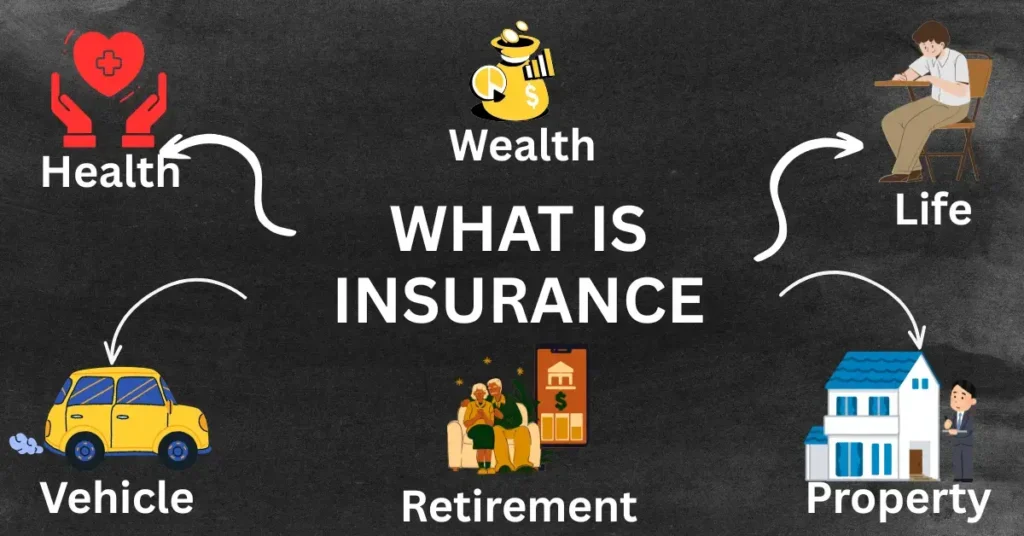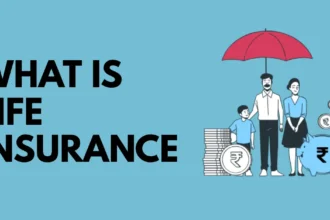Have you ever wondered how some families bounce back from devastating losses while others struggle for years to recover? The answer often lies in one simple word: insurance. Whether it’s a medical emergency that could drain your life savings or a natural disaster that destroys your home, insurance serves as the invisible guardian that transforms potential financial catastrophe into manageable moments of recovery.
- Understanding What Is Insurance: The Foundation of Financial Security
- What is insurance- full guide video
- How Insurance Works: The Risk Management Process
- Types of Insurance: Comprehensive Coverage Options
- Life Insurance Protection
- General Insurance Coverage
- The Importance of Insurance in Your Financial Journey
- Risk Management Benefits
- Insurance Principles and Best Practices
- Making Smart Insurance Decisions
- Frequently Asked Questions About Insurance
- Disclaimer

Understanding What Is Insurance: The Foundation of Financial Security
Insurance is a legally binding contract between you (the policyholder) and an insurance company (the insurer) that provides financial protection against unexpected losses in exchange for regular premium payments. Think of it as transferring the financial burden of potential risks from your shoulders to a company specifically equipped to handle such uncertainties.
The essence of insurance lies in risk pooling—thousands of people pay small amounts (premiums) into a collective fund, which then compensates those who experience covered losses. This mechanism ensures that no single person bears the full financial weight of a catastrophic event alone.
Core Insurance Components Quick Facts
| Component | Definition | Purpose |
|---|---|---|
| Premium | Regular payment to insurer | Maintains active coverage |
| Deductible | Amount you pay before coverage kicks in | Shares risk and reduces premiums |
| Sum Assured | Maximum amount insurer will pay | Defines coverage limits |
| Policy Term | Duration of coverage | Establishes protection period |
| Claim | Request for compensation | Activates insurance benefits |
What is insurance- full guide video
How Insurance Works: The Risk Management Process
Insurance operates on sophisticated risk management principles that balance protection with financial sustainability. When you apply for coverage, underwriters assess your risk profile using actuarial data and statistical models to determine appropriate premiums.
The process begins with risk assessment, where insurance companies evaluate factors like your age, health status, occupation, and the asset being insured. This evaluation determines not only whether you qualify for coverage but also the premium you’ll pay.
Once approved, your premiums join a collective pool with other policyholders. Insurance companies invest these funds strategically while maintaining sufficient reserves to pay claims promptly. When covered events occur, the claims settlement process begins, involving documentation review, investigation if necessary, and compensation according to policy terms.
Insurance Claims Process Overview
| Stage | Description | Timeline |
|---|---|---|
| Notification | Report incident to insurer | Immediately after event |
| Documentation | Submit required forms and evidence | Within specified timeframe |
| Investigation | Insurer verifies claim details | Days to weeks |
| Settlement | Compensation processed and paid | 7-30 days typically |
Types of Insurance: Comprehensive Coverage Options
Insurance categories broadly divide into life insurance and general insurance, each addressing different protection needs.
Life Insurance Protection
Life insurance provides financial compensation to beneficiaries upon the policyholder’s death, ensuring family financial security and debt coverage. Term insurance offers pure protection for specific periods at affordable premiums, while whole life insurance provides lifelong coverage with investment components.
Endowment plans combine insurance with savings, paying maturity benefits if the policyholder survives the term. Unit-Linked Insurance Plans (ULIPs) offer market-linked investment opportunities alongside life coverage.
General Insurance Coverage
General insurance protects against non-life risks including health, property, and liability issues. Health insurance covers medical expenses from hospitalizations, surgeries, and treatments, often including preventive care benefits. Motor insurance protects vehicles against accidents, theft, and natural disasters while meeting legal requirements.
Property insurance safeguards homes and belongings against fire, theft, and natural calamities. Travel insurance covers trip-related risks like cancellations, medical emergencies, and lost baggage.
Major Insurance Types Summary
| Category | Coverage Focus | Key Benefits |
|---|---|---|
| Life Insurance | Financial protection for dependents | Income replacement, debt coverage |
| Health Insurance | Medical expense coverage | Cashless treatment, preventive care |
| Motor Insurance | Vehicle protection | Accident coverage, legal compliance |
| Property Insurance | Asset protection | Damage compensation, liability coverage |
| Travel Insurance | Trip-related risks | Emergency assistance, expense reimbursement |
The Importance of Insurance in Your Financial Journey
Insurance serves as the cornerstone of comprehensive financial planning, providing stability when life takes unexpected turns. Without adequate coverage, a single medical emergency or property loss could derail decades of financial progress and savings.
The importance extends beyond individual protection to economic stability. Insurance enables business continuity, supports economic growth through investment of premiums, and provides tax benefits under various sections of the Income Tax Act.
For families, insurance ensures children’s education continues uninterrupted, mortgages get paid during disability, and living standards maintain stability during crisis periods. It transforms from expense to investment when viewed through the lens of long-term financial security.
Risk Management Benefits
Insurance facilitates effective risk management by transferring potential losses to entities specifically equipped to handle them. This transfer allows individuals and businesses to focus on growth and productivity rather than constantly worrying about potential catastrophic losses.
The psychological benefits cannot be understated—knowing you have comprehensive coverage provides peace of mind that enables better decision-making and life enjoyment.
Key Insurance Benefits Overview
| Benefit Category | Specific Advantages |
|---|---|
| Financial Protection | Loss compensation, asset preservation |
| Risk Transfer | Burden sharing, professional claims handling |
| Tax Advantages | Premium deductions, benefit exemptions |
| Peace of Mind | Stress reduction, confidence building |
| Legal Compliance | Mandatory coverage fulfillment |
Insurance Principles and Best Practices

Modern insurance operates on seven fundamental principles ensuring fairness and sustainability. Utmost good faith requires complete honesty from both parties, while insurable interest ensures legitimate financial stakes in insured subjects.
The principle of indemnity prevents profit from losses, proximate cause determines direct loss relationships, and subrogation allows insurers to pursue responsible third parties. Contribution spreads liability among multiple insurers, and loss minimization encourages preventive measures.
Understanding these principles helps policyholders make informed decisions and avoid coverage disputes during claims.
Making Smart Insurance Decisions
Selecting appropriate insurance requires careful needs assessment, comparing multiple options, and understanding policy terms thoroughly. Consider factors like coverage adequacy, premium affordability, claim settlement ratios, and insurer financial strength.
Review coverage regularly as life circumstances change, maintain detailed documentation, and communicate transparently with insurers. Professional advice often proves valuable for complex situations or significant coverage decisions.
Frequently Asked Questions About Insurance
What exactly is insurance and how does it protect me?
Insurance is a financial contract where you pay small regular amounts (premiums) to transfer the risk of large potential losses to an insurance company. It protects you by providing financial compensation when covered events like accidents, illnesses, or property damage occur, preventing these incidents from devastating your finances.
How are insurance premiums calculated?
Premiums are calculated using actuarial data that assesses your risk profile including age, health status, occupation, lifestyle factors, and the type/amount of coverage desired. Higher risk individuals typically pay higher premiums, while factors like good health, safe occupations, and higher deductibles can lower costs.
What’s the difference between deductible and premium?
A premium is the regular payment you make to maintain insurance coverage, while a deductible is the amount you must pay out-of-pocket before your insurance begins covering expenses. Higher deductibles typically result in lower premiums as you’re assuming more initial financial responsibility.
When should I buy insurance?
The best time to buy insurance is when you’re young and healthy, as premiums are lower and coverage approval is easier. For specific types: life insurance when you have dependents, health insurance immediately for medical protection, and property insurance before acquiring assets.
How do insurance claims work?
Claims involve notifying your insurer of a covered loss, submitting required documentation, allowing investigation if necessary, and receiving compensation according to policy terms. Most insurers aim to settle straightforward claims within 7-30 days of receiving complete documentation.
Can I have multiple insurance policies for the same risk?
Yes, but the total compensation cannot exceed actual losses due to the principle of contribution. Multiple health insurance policies can provide additional coverage, while multiple property policies share proportional liability for claims.
What happens if I miss premium payments?
Missing premium payments can result in policy lapse after a grace period (typically 30 days). Some policies offer reinstatement options, but maintaining continuous coverage is crucial for uninterrupted protection.
Is insurance mandatory in India?
Motor third-party insurance is mandatory by law for all vehicles. While other insurance types aren’t legally required, they’re often mandated by lenders (like home insurance for mortgages) or highly recommended for comprehensive financial protection.
How do I choose the right insurance company?
Evaluate factors including claim settlement ratio, financial strength ratings, customer service quality, network coverage, premium competitiveness, and product variety. Check with insurance regulatory authorities for company performance data and customer complaint records.
What should I do if my insurance claim is rejected?
Review the rejection reasons carefully, provide additional documentation if requested, appeal the decision through the insurer’s grievance mechanism, or escalate to insurance ombudsman or regulatory authorities if necessary.
What is insurance in simple words?
Insurance, in simple words, is a legal agreement between you and an insurance company where you pay a regular amount called a premium, and in return, the company promises to help you financially if something unexpected happens—such as an accident, illness, or damage to your property. This arrangement provides you with protection and peace of mind, as it covers costs that could be difficult to manage out of pocket. Insurance acts as a safety net, helping you and your loved ones recover from financial losses due to unforeseen events.
What are types of insurance?
Types of insurance mainly fall into two broad categories: Life Insurance and General Insurance.
Life Insurance provides financial protection to beneficiaries upon the insured’s death and includes policies like term life, whole life, endowment plans, and retirement or child plans. It helps replace lost income and covers long-term financial goals.
General Insurance covers non-life aspects such as health insurance, motor (car and two-wheeler) insurance, home insurance, travel insurance, fire insurance, marine insurance, and commercial insurance. These protect against losses from accidents, illness, property damage, theft, and other risks.
Together, these insurance types ensure coverage for life risks and various personal, health, and property-related risks.
What is insurance and benefits?
Insurance is a financial contract between an individual or entity and an insurance company, where the policyholder pays regular premiums in exchange for financial protection against specific risks or losses. This protection can cover events such as accidents, illnesses, property damage, or death. The purpose of insurance is to reduce the financial burden of unexpected events by providing compensation or coverage, helping individuals and families maintain financial stability. Benefits of insurance extend beyond financial security to include peace of mind, risk management, and sometimes tax advantages. It acts as a safety net to support people during emergencies or losses, ensuring they do not have to bear the entire cost out of pocket. Different types of insurance cover various needs, including health, life, property, and vehicle protection. Overall, insurance helps provide security and stability in uncertain times.
What is the full form of IRDA?
The full form of IRDA is the Insurance Regulatory and Development Authority of India. It is a government-established autonomous body responsible for regulating and developing the insurance industry in India. The IRDA ensures the protection of policyholders’ interests, regulates insurance companies, oversees licensing, monitors financial stability, and promotes transparency and fair competition in the insurance sector.
What is the basic purpose of insurance?
The basic purpose of insurance is to provide financial protection against unexpected losses or risks. It serves as a safety net that helps individuals or businesses minimize the financial impact of accidents, illnesses, property damage, or other unforeseen events by transferring the financial burden to an insurance company in exchange for periodic premium payments. This protection offers security, stability, and peace of mind by ensuring that the insured can recover from financial setbacks without bearing the full cost alone.
What is risk in insurance?
In insurance, risk is defined as the uncertainty of the occurrence of an event that can cause economic loss or damage. It represents the possibility that something harmful or unexpected may happen, leading to financial loss for the insured. Insurance works by transferring this risk from the insured to the insurer in exchange for a premium payment. The insurer assesses the likelihood and impact of these risks, which can include accidents, natural disasters, theft, or death, and provides financial protection against them under the terms of the insurance policy. Essentially, risk is the chance of loss or damage that insurance aims to cover and manage.
What are the two main functions of insurance?
The two main functions of insurance are:
1) Providing protection and financial security against future risks, losses, and uncertainties. Insurance compensates for losses resulting from events such as accidents, illness, or damage, helping to reduce the financial burden on the insured.
2) Sharing or pooling of risk among a large group of insured people. By collecting premiums from many, the insurer creates a fund that pays for the losses of a few, thus distributing the financial impact of risks collectively and preventing any single individual from bearing the full cost.
These functions ensure safety and stability for individuals and businesses facing uncertain future events. Insurance transforms uncertain financial loss into a predictable and manageable one through risk sharing and compensation.
What is the main goal of insurance?
The main goal of insurance is to provide financial protection and security against unexpected losses or risks, such as accidents, illness, property damage, or death. It helps individuals and businesses manage uncertainty by transferring the risk of financial loss to an insurance company in exchange for regular premium payments. This allows people to have a safety net that supports them during difficult times by covering expenses they might not be able to afford otherwise, thus promoting stability and peace of mind.
How does insurance work?
Insurance is a financial protection system where an individual or business pays regular amounts called premiums to an insurance company. In return, the insurer agrees to cover specific financial losses or risks outlined in the policy, such as damage to property, health expenses, or death benefits. The premiums paid by many policyholders are pooled together, and this pool is used to pay claims when an insured event occurs. If no claim is made, the premiums help cover losses of others in the pool. Essentially, insurance helps manage financial risks by transferring the cost of potential losses from the individual to the insurer, providing peace of mind and financial security in case of unexpected events.
What is a claim in insurance?
A claim in insurance is a formal request made by a policyholder to their insurance company asking for payment or compensation for a loss or event covered under the insurance policy. It is the process through which the insured notifies the insurer of the occurrence of a covered incident, such as an accident, illness, theft, or damage, and seeks financial reimbursement or support as per the terms of their policy. Once the insurer verifies and validates the claim, they process the payment to the insured or the designated beneficiary. Essentially, an insurance claim is how the insurance contract is put into action to provide financial protection when needed.
What is loss prevention in insurance?
Loss prevention in insurance refers to a set of risk management practices designed to reduce the likelihood and severity of losses that could lead to insurance claims. It involves identifying potential risks or hazards and taking proactive measures, either voluntarily or as required by the insurer, to minimize these risks. Examples include installing safety devices like sprinklers or security systems, or taking training courses to reduce accidents. The goal is to lower the chance of claims being filed, which benefits both the insurer, by reducing payouts, and the policyholder, often resulting in lower premiums and safer operations. Essentially, loss prevention helps both parties reduce costs and improve safety by preventing losses before they happen.
Which are the two types of insurance?
The two main types of insurance are life insurance and general insurance. Life insurance provides financial protection to beneficiaries in case of the insured person’s death, while general insurance covers other risks such as health, motor, home, and travel insurance. These two categories encompass various specific insurance policies depending on the type of risk covered.
What are the 4 most important types of insurance?
The four most important types of insurance generally recommended are life insurance, health insurance, auto insurance, and long-term disability insurance. Life insurance supports your family financially after your death, health insurance protects against major medical expenses, auto insurance covers vehicle-related damages and liabilities, and long-term disability insurance provides income if you cannot work due to disability.
What are the benefits of having insurance?
The benefits of having insurance include financial protection against unexpected losses, ensuring economic security for you and your family, helping manage risks by sharing them with the insurer, supporting long-term savings and wealth generation, and offering tax advantages. Insurance also provides peace of mind and helps maintain your standard of living during emergencies like illness, accidents, or property damage.
What are the principles of insurance?
The key principles of insurance are:
Utmost Good Faith: Both parties must disclose all material facts honestly.
Insurable Interest: The insured must have a financial interest in the subject matter.
Proximate Cause: The immediate cause of loss must be covered by the policy.
Indemnity: Compensation equals the actual loss, no profit is allowed.
Subrogation: After compensation, insurer acquires the insured’s rights to recover from third parties.
Contribution: If multiple policies exist, insurers share the claim proportionally.
Loss Minimization: The insured should take steps to minimize loss or damage.
These principles ensure fairness and proper functioning of insurance contracts.
How many types of claims are there?
There are three main types of claims: claims of fact, claims of value, and claims of policy.
What is a beneficiary in insurance?
A beneficiary in insurance is the person or entity designated to receive the policy benefits, such as the death benefit from a life insurance policy, when the insured person passes away.
What are the 6 principles of loss prevention?
The 6 principles of loss prevention are:
1) Prevention
2) Awareness
3) Compliance
4) Detection
5) Investigation
6) Resolution
These principles form a continuous cycle starting with prevention, aimed at minimizing and managing losses effectively.
What is a control in insurance?
In insurance, “control” means having the power to direct or influence the management and policies of an insurer, typically through ownership, contracts, or other means, including holding a significant voting interest or authority over decisions. It involves the ability to govern the company’s operations and strategic direction. This definition is used in regulatory contexts to determine when a person or entity effectively controls an insurance company.
What is a death benefit?
A death benefit is the money paid to the beneficiary of a life insurance policy or similar contract after the insured person dies. It is usually a lump sum or periodic payments intended to provide financial support to the insured’s family or other beneficiaries and is typically tax-free. The amount and payment conditions are set in the insurance contract. Beneficiaries must submit proof of death to claim this benefit.
Who pays a beneficiary?
A beneficiary is paid by the entity holding the assets or benefits, such as an insurance company, bank, or estate executor, who transfers the money or property to the beneficiary according to the terms of the policy, account, or will.
Insurance transforms financial uncertainty into manageable risk, providing the foundation for confident living and strategic planning. Whether protecting against health emergencies, property losses, or providing for loved ones, comprehensive insurance coverage serves as your financial guardian, ensuring that life’s inevitable challenges become stepping stones rather than stumbling blocks. Start building your insurance portfolio today—your future self will thank you for the wisdom and foresight of securing comprehensive financial protection.
Disclaimer
The information shared on Calculator Singh is for educational and informational purposes only. We are not SEBI-registered financial advisors or licensed insurance agents. Please consult a qualified financial advisor or tax professional before making any investment, insurance, or financial decisions. You are solely responsible for your financial choices — Calculator Singh will not be liable for any losses or risks arising from the use of our content.








